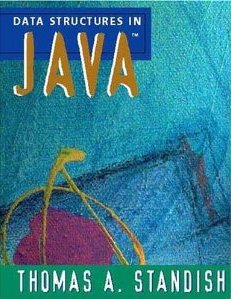|
|
|
Last revised January 20, 2015
The
contents of this website, the links contained therein directly and
indirectly, and the contents of the said links, are copyrighted. They are provided exclusively for
non-profit educational use by the students currently enrolled in this
course and for the duration of this semester. No other use or any use by others is allowed
without authorization of the professor in this course and copyright holder or holders. No videotaping or recording without professor's prior permission is allowed in class.
Please, no food no drinks in the classroom.
Proper attire required - please, no tank-tops.
Course
Description
OFFICE HOURS:

PREREQUISITES:
CSC 123 (Intro to CS and Programming), MAT 281
(Discrete Math) and their prerequisites, with grade C or better. OBLIGATORY
TEXTBOOK. The scope of the course is covered by: Thomas A. Standish,
Data Structures in Java, Addison - Wesley (Reading, Mass. 1998), ISBN-10: 020130564X, ISBN-13: 978-0201305647.The students enrolled in this course can loan this textbook from the Department for the duration of the entire semester free of charge (while the supply lasts). A nominal refundable deposit will be required.SCOPE.
Students are responsible for material covered by lectures, assigned
readings and exercises, and are assumed to preliminarily read
appropriate parts of the textbook before the material is covered in
class, according to the following syllabus. OBLIGATORY
TEXTBOOK. The scope of the course is covered by: Thomas A. Standish,
Data Structures in Java, Addison - Wesley (Reading, Mass. 1998), ISBN-10: 020130564X, ISBN-13: 978-0201305647.The students enrolled in this course can loan this textbook from the Department for the duration of the entire semester free of charge (while the supply lasts). A nominal refundable deposit will be required.SCOPE.
Students are responsible for material covered by lectures, assigned
readings and exercises, and are assumed to preliminarily read
appropriate parts of the textbook before the material is covered in
class, according to the following syllabus.
QUIZZES.
A number of short quizzes will be administrated during semester. They
will be announced one class ahead. One lowest quiz score will be
dropped.MIDTERM. One midterm (60 min) will cover the foregoing material. The midterm is scheduled on Thursday, March 26, 2015. It will earn credit of 0 - 30 points.FINAL EXAM (120 min.) will cover the material discussed in
class and assigned as readings. The exam is scheduled on Tuesday, May 12, 2015. It will earn 0 - 50 points.GRADING. The following elements contribute to the total score.
Homework not graded
Programs 0 - 10 %
Quizzes 0 - 10 %
Midterm 0 - 30 %
Final 0 - 50 %
====== =======
Total 0 - 100 %
Course grade will be determined according to the following schedule.
0 - 45% yield F (failing work)
46 - 50% yield D (barely passing)
51 - 55% yield D+
56 - 60% yield C-
61 - 65% yield C (satisfactory achievement)
66 - 70% yield C+
71 - 75% yield B-
76 - 80% yield B (very good achievement)
81 - 85% yield B+
86 - 90% yield A-
91 - 100% yield A (excellent achievement)
Other grades (e.g. incomplete) will be assigned in cases specified by the university regulations.
ASSIGNMENTS.
Homework assignments will not be collected or graded. For the needs of
course documentation, the midterm and the final will not be returned to
the students.
For
the same reason, programming assignments will not be returned unless
submitted in duplicate. Except for permitted use of procedures included
in the handouts, each program is supposed to be a 100% individual work;
in particular, no form of collaboration or help is allowed. They will
be made available during the class following the test and during office
hours for the remainder of the semester.
NO-MAKE-UP
POLICY. No make-ups will be given. Late programs will not be accepted.
However, one quiz may be missed since the lowest quiz score will be
dropped anyway.
ADA STATEMENT Students with disabilities, who believe they may need an
academic adjustment in this class, are encouraged to contact Disabled
Student Services as soon as possible to better ensure receipt of timely
adjustments.
ACADEMIC
INTEGRITY. Students are reminded of the university policy with regard
to scholastic honesty. In this class, submission for credit of any
assignment, program, test, or examination that is not the student's
original work or contains portions of someone else's work without being
clearly and specifically identified as such, as well as cheating on
tests or examination, are violations that will
automatically yield zero credit for the submitted work and may also
result in an F grade in the course or in university disciplinary
action, or both.
CSUDH Academic Inegrity policies are listed in the Catalog. You are
supposed to know what they are, including definitions of cheating,
plagiarism, and dishonesty. A link below has been provided for your
conveninece:
http://www4.csudh.edu/student-rights/academic-integrity/
STUDENT ACADEMIC APPEAL
PROCESS Authority and responsibility for assigning grades to students
rests with the faculty. A grade appeal is permitted when a student can
show clear evidence that a grade was contrary to procedures as
specified in the course syllabus, was based on prejudice, was
capricious, or was the result of computational or clerical error. The
presumption is that the grades assigned are correct until there is a
clear demonstration otherwise. The burden of proof is heavy, and it
rests with the student who is appealing.
|
|
|
|
|
|
|